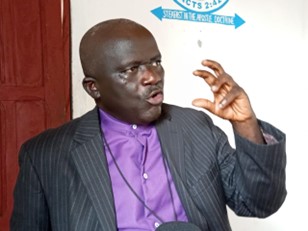In a powerful address, Bishop Kortu Brown, a prominent figure in the Liberian clergy, voiced deep concerns regarding the unresolved murders of innocent individuals in Liberia, including Rev. William Tolbert III, Charloe Musu, and Precious Cooper. During a morning prayer meeting held at his church, New Water in the Desert Assembly Apostolic Pentecostal Church in Brewerville, he lamented the lack of accountability and transparency in the investigations of these tragic events. He emphasized that the delay in identifying the perpetrators of such heinous acts not only undermines justice but also creates an atmosphere of fear and uncertainty among the populace.
Drawing parallels from the Bible, specifically referencing Second Samuel 21:1-7, Bishop Brown highlighted the historical repercussions that arose from King Saul’s unjust actions in ancient Israel. He articulated that the kingdom suffered for three years due to a famine that was a consequence of bloodshed, suggesting that similar outcomes could plague Liberia if the current trend of violence and impunity continues. This biblical narrative served to underscore his call for introspection among both the leaders and citizens of Liberia regarding the moral and spiritual implications of homicide and the broader societal impact of unresolved violence.
Bishop Brown’s call for action was not only directed toward the general public but specifically targeted the Liberia National Police and the Ministry of Justice. He urged these authorities to act decisively in solving ongoing murder investigations and ensuring that the rightful perpetrators are brought to justice. His message was clear: the blood of innocent victims should not rest on the hands of those entrusted with maintaining law and order. His warning resonated as a call for urgent and effective law enforcement that prioritizes the protection of citizens and the upholding of their rights to life and security.
Reiterating the devastating societal effects of unchecked violence, Bishop Brown warned that the continued targeting and killing of innocent individuals via various means—be it physical violence, witchcraft, or revenge—could culminate in severe hardship for the nation. He articulated a vision of communal healing and hope, calling on Liberians to pursue justice and rule of law in resolving conflicts rather than resorting to violence. Such a shift in behavior, he argued, would not only prevent further loss of life but would also establish a foundation for a more just and peaceful society.
The urgent need for collective accountability was a central theme in Bishop Brown’s remarks. He called upon Liberians to take ownership of their communal safety and well-being, promoting dialogue and nonviolence as means to address grievances. His appeal resonated with universal values of peace and coexistence, urging the population to reject cycles of violence and embrace mutual respect and understanding. Bishop Brown’s impassioned plea serves as a critical reminder of the moral imperative to protect the vulnerable and uphold justice.
Bishop Kortu Brown’s reflections highlight a pivotal societal concern in Liberia, urging both authorities and citizens to confront the persistent issue of violence and unsolved murders. His eloquent invocation of spiritual principles and historical context underscores the urgency of addressing these matters with integrity and resolve. As Liberia grapples with its legacy of violence, Brown’s call for unity, justice, and accountability resonates as a constructive path forward, grounding the fight against impunity in both moral conviction and communal commitment to a dignified and just society for all.














